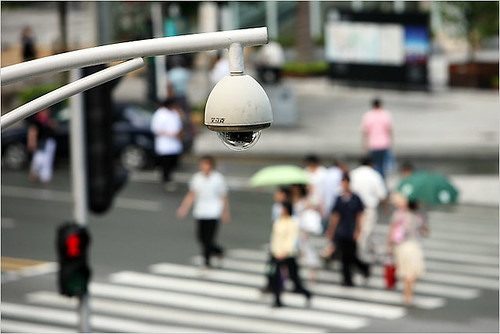 [Image: Surveillance cameras for sale in China; photo by Timothy O'Rourke for The New York Times].
[Image: Surveillance cameras for sale in China; photo by Timothy O'Rourke for The New York Times].While these cameras and other forms of remote sensing are being installed to keep Olympic athletes and their screaming fans safe during the coming summer's Games, the worry is that the surveillance will simply stay put:
- Long after the visitors leave, security industry experts say, the surveillance equipment that Western companies leave behind will provide the authorities here with new tools to track not only criminals, but dissidents too... Indeed, the autumn issue of the magazine of China’s public security ministry prominently listed places of religious worship and Internet cafes as locations to install new cameras.
- Honeywell has already started helping the police to set up an elaborate computer monitoring system to analyze feeds from indoor and outdoor cameras in one of Beijing’s most populated districts, where several Olympic sites are located. The company is working on more expansive systems in Shanghai, in preparation for the 2010 World Expo there – in addition to government and business security systems in Guangzhou, Shenzhen, Nanjing, Changsha, Tianjin, Kunming and Xi’an. General Electric has sold to Chinese authorities its powerful VisioWave system, which allows security officers to control thousands of video cameras simultaneously and automatically alerts them to suspicious or fast-moving objects, like people running. The system will be deployed at Beijing’s national convention center, including the Olympics media center. I.B.M. is installing a similar system in Beijing that should be ready before the Olympics and will analyze and catalog people and behavior.
James Mulvenon, director of the Center for Intelligence Research and Analysis, remarks that "the pace of technological change means that products with mainly civilian applications, like management computer systems with powerful video surveillance features, [have] blurred the distinction between law enforcement and civilian technologies." And it's in that blurring that some U.S. security firms have potentially brushed up against the outer edge of illegal commercial activity: that is, supplying China with these cameras might at least partially violate "a sanctions law Congress passed after the Tiananmen Square killings" in 1989.
 [Image: Surveillance in China; photographer temporarily unknown, though this appeared in The New York Times several months ago].
[Image: Surveillance in China; photographer temporarily unknown, though this appeared in The New York Times several months ago].All of this also highlights the increasingly intense overlap between film production, the political administration of urban space, and the private security industry, whereby three otherwise unrelated fields become nearly indistinguishable from one another – or, perhaps more accurately phrased, they become erstwhile partners in pursuit of different goals.
In fact, I have often thought it would be interesting – and I have actually written an entire unpublished novel about a very similar idea, set in London (attention, editors! seriously!) – if a well-known, and wealthy, film production firm such as Universal Pictures, or Warner Brothers, or even Film Four, were to sign a legal contract with, for example, the City of London, after which Universal would financially underwrite the installation of a brand new and geographically extensive security camera system.
Universal (or whomever – maybe Bollywood will do this) would retain all legal rights to the footage thus generated – the ultimate reality TV show: London in real-time – yet they'd be contractually obligated to let the City of London use the footage for law enforcement purposes. Beyond a certain timeframe, though, Universal keeps all the film.
Meanwhile, the City has found itself an additional revenue stream and a partner in fighting crime (or, at least, in filming it), and reality TV – reality cinema – has never had it so good. A bottomless well of new footage.
All London needs is a good editor™.
So might that be the urban security model of the future? Cities will lease urban image rights to film production firms? Your willful participation will simply be assumed.
Soon, London, New York, and Tokyo are owned by Sony Pictures; Paris, Rome, and New Delhi sign binding contracts with Warner Brothers; and every other city in between falls to one of half a dozen rival production companies.
Armed film companies replace mayors and town halls as the urban administrators of tomorrow.
Taxes are cut almost to nothing: government revenue is entirely film-generated. You can syndicate the events of yesterday on televisions round the world, and earn tens of millions of euros in the process.
After all, what would you do if you found out that New Line Cinema, or Dreamworks, or Canal+, had just installed tens of thousands of cameras throughout greater Moscow – and that the footage being generated was starting to show up on TV?
We are the stars now®.
Perhaps I should add that I think this is a very dystopian scenario, and I am not at all advocating that it be implemented; nonetheless, the literary and cinematic possibilities are, for me, quite exciting – and, to be frank, it sounds financial workable for both parties.
In any case, if you're off to Beijing for the Olympics next summer, don't forget to look your best: you'll be on film...
(Vaguely related: Filmmaker Adam Rifkin talks to Wired about the cinematic possibilities of CCTV – with belated thanks to Christopher Stack!)
No comments:
Post a Comment